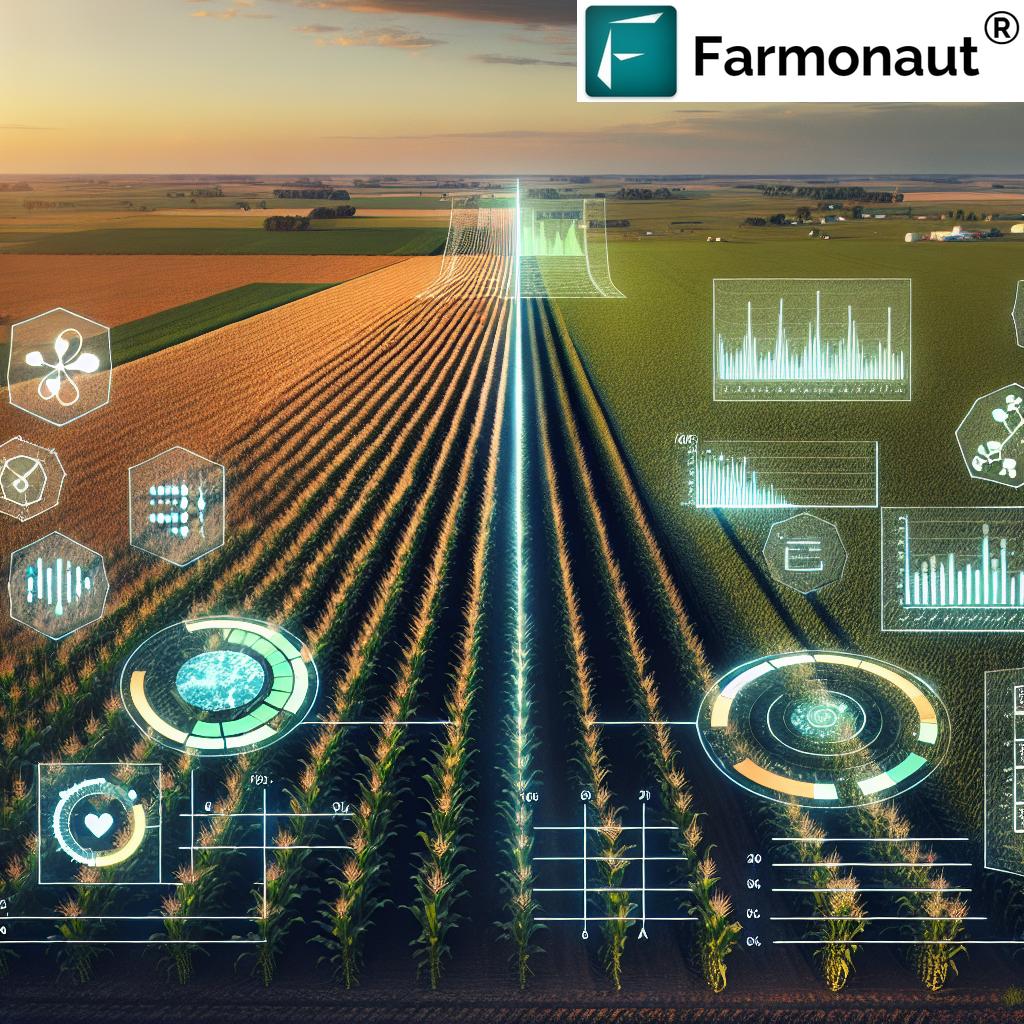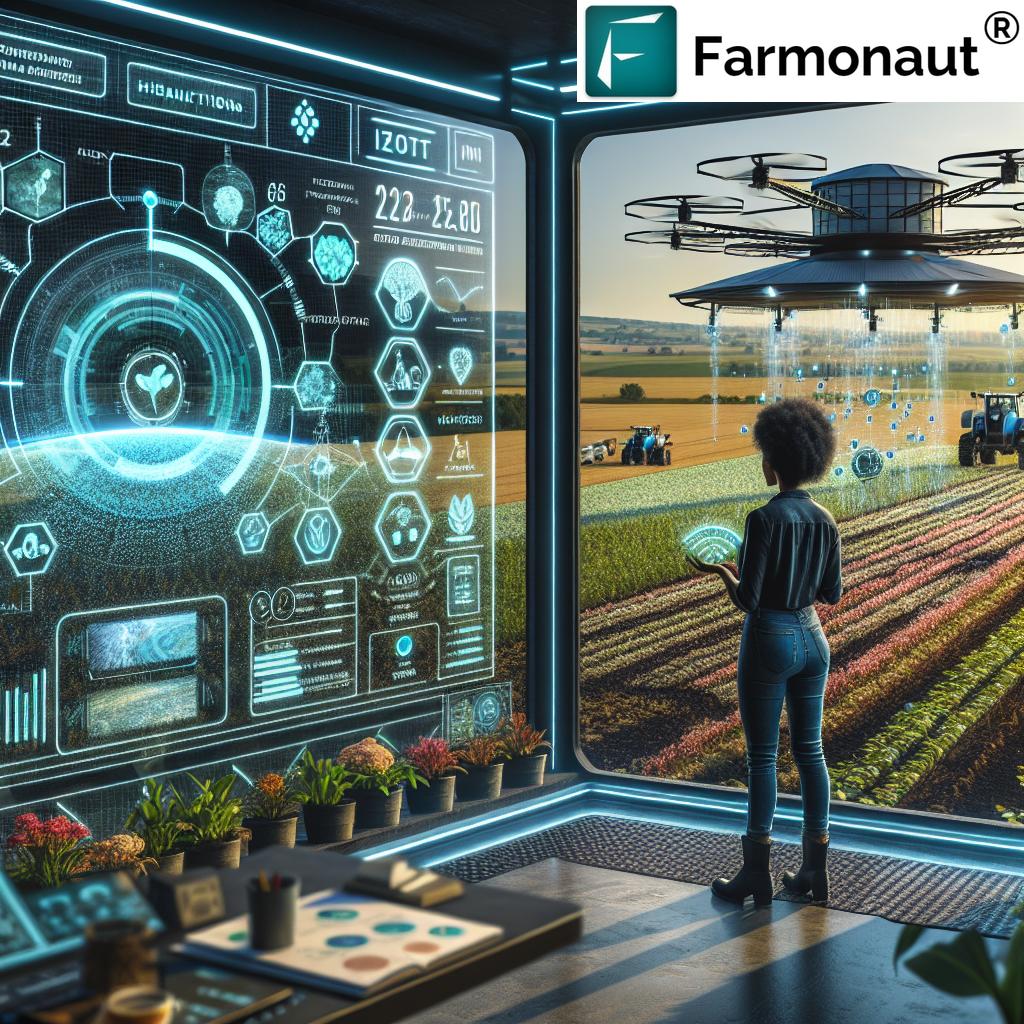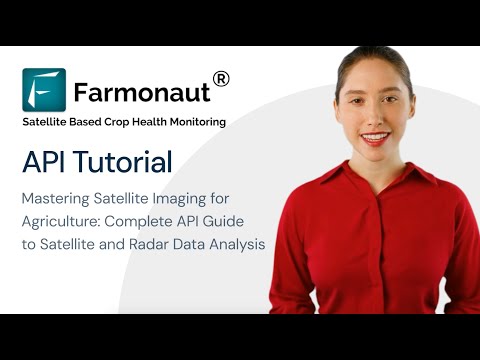Revolutionizing Iowa Farms: How Precision Agriculture and Remote Sensing Boost Crop Yields and Sustainability
In the heartland of America, Iowa’s sprawling fields of corn and soybeans are undergoing a quiet revolution. As we step into an era where technology and agriculture intersect, precision agriculture and remote sensing are transforming the way we farm, promising to boost crop yields while promoting sustainability. This revolution is not just changing the face of Iowa’s agriculture; it’s reshaping the future of farming across the United States and beyond.
The Dawn of Precision Agriculture in Iowa
Iowa, known as the Corn State, has long been at the forefront of agricultural innovation. Today, we’re witnessing a paradigm shift as precision agriculture takes center stage. This approach combines data, technology, and agronomic practices to optimize crop production and resource management.
At the heart of this transformation is the integration of remote sensing technologies. Satellites, drones, and IoT sensors are now the eyes and ears of modern farmers, providing unprecedented insights into crop health, soil conditions, and environmental factors.

The Role of Remote Sensing in Modern Agriculture
Remote sensing in agriculture has become an indispensable tool for Iowa farmers. By leveraging multispectral and hyperspectral imaging, we can now gather critical data about crop health, soil moisture, and even pest infestations without setting foot in the field. This technology allows for:
- Early detection of crop stress
- Precise mapping of soil variability
- Accurate yield predictions
- Efficient resource allocation
One of the pioneers in this field is Farmonaut, offering advanced satellite-based farm management solutions that make precision agriculture accessible to farmers of all scales.
Precision Agriculture: A Game-Changer for Crop Management
Crop management has evolved from a one-size-fits-all approach to a highly personalized strategy. With precision agriculture, Iowa farmers can now:
- Implement variable rate technology for precise application of inputs
- Utilize field monitoring systems for real-time crop health assessment
- Employ farm data analytics to make data-driven decisions
- Optimize irrigation through advanced water management in agriculture
These practices not only boost productivity but also contribute to sustainable farming by reducing resource waste and environmental impact.
Soil Fertility Management: The Foundation of Sustainable Agriculture
Soil fertility management is crucial for maintaining high crop yields and ensuring long-term sustainability. Precision agriculture tools enable farmers to:
- Create detailed soil maps
- Implement targeted fertilization strategies
- Monitor soil health in real-time
- Reduce nutrient runoff and eutrophication
By optimizing nutrient management in crops, Iowa farmers can significantly reduce their environmental footprint while improving crop performance.
Water Management: Preserving a Precious Resource
In Iowa, where water quality and conservation are paramount, precision agriculture offers innovative solutions for water management in agriculture. Advanced technologies allow farmers to:
- Monitor soil moisture levels with high accuracy
- Implement precision irrigation systems
- Reduce water usage without compromising crop yields
- Minimize nutrient leaching and protect water quality
These practices not only conserve water but also contribute to the overall sustainability of Iowa’s agricultural sector.
Crop Health Monitoring: Early Detection, Timely Action
Crop health monitoring has been revolutionized by remote sensing technologies. Iowa farmers can now detect issues such as pest infestations, diseases, and nutrient deficiencies before they become visible to the naked eye. This early detection allows for:
- Timely and targeted interventions
- Reduced use of pesticides and herbicides
- Improved crop quality and yield
- Enhanced decision-making in crop protection strategies
Farmonaut’s satellite-based crop health monitoring system is at the forefront of this technology, providing farmers with real-time insights into their fields’ conditions.

The Impact of Precision Agriculture on Iowa Farms
The adoption of precision agriculture and remote sensing technologies has had a profound impact on Iowa’s agricultural landscape. Let’s take a closer look at the transformative effects:
| Metric | Traditional Farming | With Farmonaut Satellite System |
|---|---|---|
| Crop Yield Increase (%) | Baseline | +15-25% |
| Water Usage Reduction (%) | Baseline | 30-40% |
| Fertilizer Efficiency Improvement (%) | Baseline | 20-30% |
| Pest Management Effectiveness (%) | Baseline | +25-35% |
| Soil Health Improvement (Score out of 10) | 5 | 8 |
| Greenhouse Gas Emissions Reduction (%) | Baseline | 15-20% |
| Overall Farm Profitability Increase (%) | Baseline | +20-30% |
These figures demonstrate the significant improvements that precision agriculture can bring to Iowa farms, enhancing both productivity and sustainability.
Sustainable Farming Practices: A Necessity for the Future
Sustainable farming is no longer just an option; it’s a necessity for the future of agriculture. Iowa farmers are increasingly adopting climate-smart agriculture practices that not only boost productivity but also protect the environment. These include:
- Conservation tillage
- Cover cropping
- Precision nutrient management
- Integrated pest management
By leveraging precision agriculture technologies, farmers can implement these practices more effectively, reducing their environmental impact while maintaining high yields.
The Role of Data in Modern Agriculture
At the core of precision agriculture is data. The ability to collect, analyze, and act on vast amounts of agricultural data is transforming farming from an art into a data-driven science. Iowa farmers are now leveraging:
- Farm data analytics for informed decision-making
- Crop yield optimization algorithms
- Predictive modeling for weather and market trends
- Machine learning for personalized agronomic recommendations
Farmonaut’s platform integrates these data-driven insights, providing farmers with a comprehensive tool for managing their operations efficiently.
Overcoming Challenges in Precision Agriculture Adoption
While the benefits of precision agriculture are clear, its adoption in Iowa and across the United States faces several challenges:
- Connectivity issues in rural areas
- Initial costs of technology implementation
- Data privacy concerns
- Need for education and training
Addressing these challenges requires a collaborative effort between farmers, technology providers, and policymakers. Initiatives to improve rural broadband access, provide financial incentives for technology adoption, and develop comprehensive data governance frameworks are crucial for the widespread implementation of precision agriculture.
The Future of Agriculture in Iowa and Beyond
As we look to the future, the role of precision agriculture and remote sensing in shaping Iowa’s agricultural landscape is set to grow. Emerging technologies such as:
- Agricultural drone technology for ultra-high-resolution imaging
- Advanced agricultural IoT sensors for real-time monitoring
- Artificial intelligence for automated decision-making
- Blockchain for improved traceability in the food supply chain
These innovations promise to further revolutionize farming practices, making agriculture more efficient, sustainable, and resilient to challenges like climate change and population growth.
The Role of Farmonaut in Iowa’s Agricultural Revolution
In this landscape of technological transformation, Farmonaut stands out as a key player in bringing advanced agricultural solutions to Iowa farmers. By leveraging satellite technology and AI, Farmonaut provides:
- Real-time crop health monitoring
- AI-driven advisory systems
- Blockchain-based traceability solutions
- Resource management tools
These tools empower Iowa farmers to make data-driven decisions, optimize their operations, and embrace sustainable farming practices.
Explore Farmonaut’s solutions:
For developers: Integrate Farmonaut’s powerful satellite and weather data into your own applications with our API. Check out our comprehensive API Developer Docs to get started.
Trivia: Did You Know?
“Precision agriculture can increase crop yields by up to 30% while reducing water usage by 20-50%.”
“Iowa farms using remote sensing technology have reported a 15% decrease in fertilizer use and 10% increase in profitability.”
Embracing the Future of Farming
As we continue to innovate and adapt, the future of farming in Iowa looks brighter than ever. By embracing precision agriculture and remote sensing technologies, we’re not just increasing yields and efficiency; we’re paving the way for a more sustainable and resilient agricultural sector.
The revolution in Iowa’s farms is more than just a technological upgrade—it’s a fundamental shift in how we approach farming. It’s about producing more food, feed, and fiber for a growing population while reducing our environmental footprint. It’s about using our resources more wisely, protecting our soil and water, and ensuring that farming remains a viable and rewarding profession for generations to come.
As we look to the future, one thing is clear: the integration of precision agriculture and remote sensing into Iowa’s farming practices is not just an option—it’s a necessity. By leveraging these technologies, we can ensure that Iowa remains at the forefront of agricultural innovation, producing abundant crops while preserving the land for future generations.
FAQs
- Q: What is precision agriculture?
A: Precision agriculture is an approach to farm management that uses information technology and data analysis to optimize crop yields and reduce resource use. - Q: How does remote sensing benefit farmers?
A: Remote sensing provides farmers with real-time data on crop health, soil conditions, and environmental factors, allowing for more informed decision-making and targeted interventions. - Q: Is precision agriculture expensive to implement?
A: While there can be initial costs, many precision agriculture tools, like Farmonaut’s satellite-based solutions, are designed to be cost-effective and accessible to farmers of all scales. - Q: How does precision agriculture contribute to sustainability?
A: By optimizing resource use and reducing waste, precision agriculture helps reduce the environmental impact of farming while maintaining or increasing productivity. - Q: Can small farms benefit from precision agriculture?
A: Yes, many precision agriculture tools are scalable and can provide significant benefits to small farms, helping them compete more effectively in the market.
As we embrace these technological advancements, let’s remember that at the heart of this revolution are the farmers—the stewards of the land who work tirelessly to feed the world. By providing them with the tools and knowledge to farm more efficiently and sustainably, we’re not just changing agriculture; we’re securing a better future for all.






